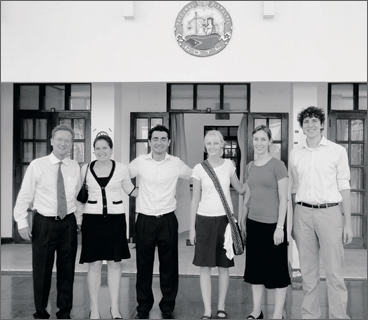Timor-Leste Legal Education Project
Stanford Law School has made great strides in creating opportunities for students to assist in developing legal education abroad—first through the Afghanistan Legal Education Project (ALEP), which launched three years ago and has created Afghanistan’s first legal curriculum focused on Afghan law. ALEP’s success led authorities in other countries to seek Stanford Law’s assistance, and last year the Bhutan Law and Policy Project was inaugurated, with assistance from the Martin Daniel Gould Center for Conflict Resolution, to aid the Bhutanese in developing a mediation system to resolve disputes that have begun to emerge with economic development.

This year, work began on yet a third project, this time in East Timor. The Timor-Leste Legal Education Project is a partnership with The Asia Foundation. It was forged by Erik Jensen, lecturer in law and co-director of the Rule of Law Program, who launched the two previous projects as well. Under his guidance, students are developing applied teaching materials, based on Timorese law, in contract drafting and legal ethics.
Preparation for this latest venture got under way in the fall of 2009 in Jensen’s State-Building and the Rule of Law Workshop. Students researched important background topics for the project, such as the history of education and legal training and the state of the economy and the business environment in East Timor.
Jensen then traveled to East Timor last winter to meet with representatives of the judiciary, the legal profession, and the private sector to learn more about the context of legal education and to identify how Stanford’s resources could be of most assistance.
The initial focus of the project is to provide accessible educational materials. Under Jensen’s guidance, the project aims to complement the doctrinal legal education curriculum currently in place by developing applied teaching materials. This September, Jensen and several Stanford Law students traveled to East Timor to test training materials at the national law school and a training center for practicing lawyers.
“It’s fantastic to have worked so hard on a project that seemed so far away and now come face to face with the key players. Meeting with NGOs, government officials, educators, influential lawyers, and students has added necessary dimension to our project,” says Kathryn Blair ’11 (BA ’05, MA ’06). “My understanding of the needs and the future of the project has grown monumentally in the few short days we have been in the country. The desperate need for legal education, outreach, and socialization is clear from just a few meetings. The potential for impact here is immense, and this is a community that is excited about change, excited about the future, and excited to be working with us. We look forward to continued engagement and seeing the implementation and effects of what we have begun.”
“The project gives us the rare privilege of teaching fellow law students in a young, rapidly changing democracy,” says Rufat Yunayev ’11. “Timor is not only a breathtakingly beautiful island, but it is one of the newest independent democracies in the world. Its population is still adapting to its new formal legal system, so the project gives us a chance to engage in the future of the country—its youth—at a strategic juncture. Our work involves much more than teaching law or writing legal materials; we are tackling the fundamental questions that law raises for every society. For example, what is the role of the law? Why is it necessary?”
In conjunction with The Asia Foundation, the project’s long-term goal is to contribute to the development of domestic legal education focused on Timorese law and its relationship to real problems that Timorese face in their society and their economy. “Our niche is clearly in developing applied materials about Timor law that will, we hope, provide a vibrant supplement to the Western European-style doctrinal education that Timor-Leste law students now receive,” says Jensen.
Visit Stanford Lawyer #82, “The King and US” to read about the recently inaugurated Bhutan Law and Policy Project (BLPP)
Visit Stanford Lawyer #79, “Legal Education in Afghanistan” Stanford Lawyer #79, “Legal Education in Afghanistan” to read about the Afghanistan Legal Education Project (ALEP), a student-led initiative to help Afghan universities improve the quality of their legal education.
